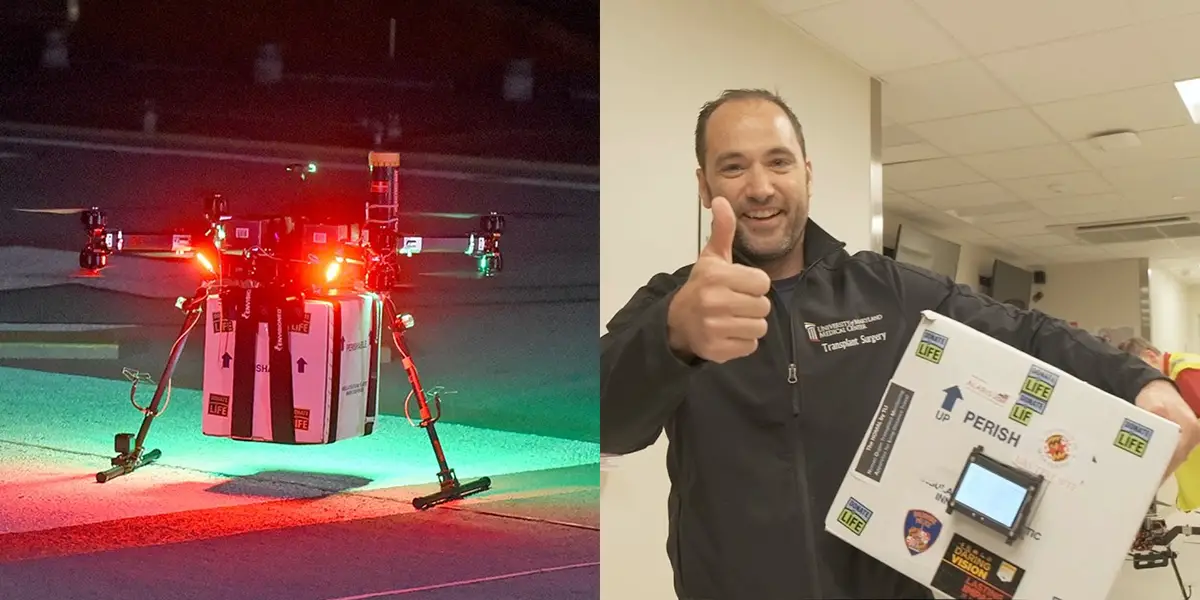For The First Time Ever A Kidney Was Delivered Via Drone For A Transplant
Tags: opinion

On the night of 19th April, a drone about the size of a washing machine suddenly lifted from an area in southwestern Baltimore. It carried the rejuvenator of ‘life’ of a human being – a kidney which it transported to a nearby hospital. The surgeons successfully made the kidney transplant and the patient survive.
Sounds like the future is here, doesn’t it?
This was a 10-minute flight by a drone, which covered 2.8 miles to deliver a kidney. And it won’t be the last time that this thing is happening. The success, the life saved, shows that this technology is going to last for long. Even now, drones deliver many medical supplies to African nations and Rwanda and the Pacific island nation of Vanuatu. Now, organ-supplying drones are taking off in US soil. Soon, maybe the globe.
Read: Robert Downey Jr Plans To Save The Planet With Robots & Artificial Intelligence
There are many remote areas which do not have the benefit of organ transplant due to lack of accessibility. Now, according to a transplant surgeon, Joseph R. Scalea, who was the leader behind this project, accessibility would be easier and costs will diminish too. Sounds like a win-win situation.
This drone flight was planned for about 3-years under the collaboration of researchers, aviation experts, engineers and doctors from an organisation based in Baltimore, Living Legacy Foundation of Maryland and the University of Maryland Medical Center. According to Robert Graboyes, who is a senior fellow at the George Mason University in Arlington in Virginia, this was a spectacular achievement.
But the flight was ‘life’ for the Baltimore resident Trina Glipsy who had the transplant. She has passed about 8 years with dialysis and seen people die because of kidney failure. For her, the drone was magic.
Organ transplantations are very sensitive and if an organ has been taken out, it must be replaced immediately. Accessibility becomes an issue and even if the place is accessible, it takes time to transport an organ across the streets. Helicopters have limitations too. Charters are very expensive and transportation through commercial airlines is extremely slow. Drones can decrease the time consumption during transit by about 70%.
And that’s a miracle for some.
After childbirth, when a mother is haemorrhaging, a minute of advantage could give her life. Drones can be just the thing for them.
Read: This Surgeon Wants To Connect Your Brain To The Internet
The autonomous drone is not something used as a hobby – it is specialized to carry nested boxed with organs and the eight-rotor drone has powerful batteries and communication gear to keep things lifted up. They are also fitted with a parachute so that they don’t come crashing down when there is any kind of malfunction.
A new system was created while considering the regulations of FAA so that the drone was capable of carrying the organ safely, hover overpopulated area and have active communication systems in it. Every part of the journey is critical for the life of the patient. But there is hope that once this system becomes properly activated, we can have the drone flying with organs in fairly populated areas.
Truth Theory is on Instagram, make sure you follow us for all the cool updates, click here
Obstacles
But there are hurdles. American airspace is already crowded with choppers and aeroplanes and so, federal regulations prohibit any other flying object, unless they are within the line of sight of the operator. There could be a chance of an accident in the busy skies. Firstly, drones have to make their communication system perfectly secure so that no hackers can hack into it and deviate it from a given route. The technology is still not advanced enough, even though our imagination might see hundreds of drones flying around, carrying major organs to the hospitals and saving lives.
Even now, over 113,000 people require an organ transplant. It’s clear we need to have these drones fast. For them at least.
IMAGE CREDIT: University of Maryland Medicine
Leave Comment: